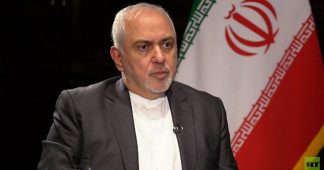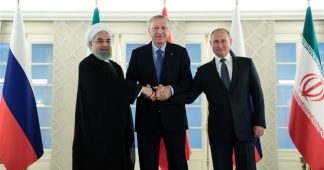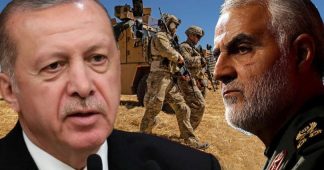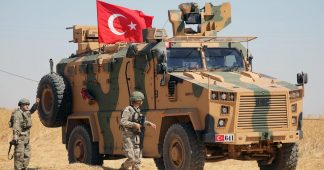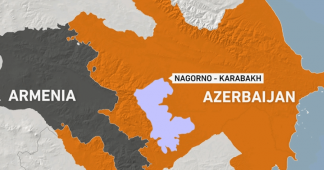Meanwhile, officials warn of electricity shortages, Iraq-Iran war landmines still claiming lives, and outflow of capital continues amid the economic crisis
Jun 10, 2022
As Ankara continues to amass troops for another military operation against Kurdish forces controlling northern Syria, a former Iranian diplomat has warned that a military confrontation between Iran and Turkey in the war-torn country is inevitable.
Since the beginning of the Syrian civil war in 2011, the two regional rivals have backed opposing sides.
Iran is the leading supporter of Syrian President Bashar al-Assad, while Turkey supports anti-government groups.
“A confrontation between Iran and Turkey is highly likely [in Syria], and such a confrontation would lead to clashes between the two countries’ troops,” Ali Akbar Farazi, Iran’s former ambassador to Romania, Cyprus, and Hungary, told the Shargh daily.
The retired diplomat revealed that Iranian and Turkish forces had already fought against each other during previous invasions carried out by Turkey in northern Syria.
“Turkey’s army, on previous occasions, attacked Iranian forces and positions, causing losses,” said Farazi.
“To achieve its interests, Turkey does not recognise any red lines.”
The former diplomat said Iran was concerned in particular about the possible occupation of the city of Homs by Turkish forces.
“In recent years, Turkey has proved that it peruses an invasive policy… based on this policy and the Neo-Ottomanism ideology, Turkey invaded Syria and Iraq and annexed parts of these two countries to its territory,” he added.
Iran-Iraq war landmines still claiming lives
Thirty-four years after the end of the Iran-Iraq war, landmines planted during the conflict are still claiming lives in Iran’s five western provinces.
Doctor Payam Jalali, a provincial director at Iran’s Red Crescent Society, told local media that the explosive devices cause several deaths and injuries each year despite government programmes to clear minefields.
Around 20 million mines were planted in Eilam, Kurdistan, West Azerbaijan, Kermanshah, and Khuzestan during the eight years of the war, which took place from 1980 to 1988.
Iranian officials do not provide comprehensive data on the number of annual casualties caused by landmines. However, the Etemad daily reported that in Eilam province alone, 348 people were killed and 613 injured by mines between 1988 and 2022.
Etemad said that most of the landmine victims were farmers and nomads who live near the Iran-Iraq border.
Iran remains the country with the second-highest number of deployed landmines after Egypt, despite authorities beginning a nationwide landmine clearance programme in 2008.
Experts say Iran’s minefield clearance plans have progressed slowly due to the use of outdated techniques and the deployment of a very small number of humanitarian deminers.
Electricity shortages loom, say officials
Iran’s energy minister and officials at the country’s Power Generation Transmission and Distribution company have said that electricity cuts during the summer are the only solution to managing electricity shortages.
Prior to 2019, Iran exported electricity to neighbouring countries, but severe electricity shortages during the past two summers have led to blackouts in all major cities.
Following a sudden increase in temperature since June, Ali Akbar Mehrabian, Iran’s energy minister, blamed ordinary customers for the power shortage, saying that “electricity cuts depend on customers’ consumption behaviour.”
“If we do not have a thrifty consumption, electricity cut will happen.”
The Arman daily reported that authorities had already forwarded a power cut schedule to private factories and industrial units.
Payam Bagheri, a board director at the Iran Electrical Industry Syndicate, told Arman that outdated infrastructure and a lack of investment in the industry by the government were the leading causes of the current electricity crisis.
Exiting capital flows on the rise
The increasing amount of capital leaving Iran’s economy has become one of the authorities’ gravest concerns as the country’s economic crisis worsens.
The large capital outflow could be one of the reasons why foreign investors seem reluctant to come to Iran, according to Faryal Mostofi, an expert who spoke to the Shargh newspaper.
“Why should foreign firms invest in Iran when they see domestic investors cannot work in their country and the wave of capital outflow continues from Iran?” Mostofi asked.
Outlining the reasons for the issue, Mostofi said that “international sanctions, management incompetence, corruption, inefficiency, nepotism, and strict regulations” had prompted Iranians to invest their money in countries other than their homeland.
The newspaper also added that Iran’s leading economic and political partners, China and Russia, had not so far met their commitment to invest in Iran for the same reasons.
We remind our readers that publication of articles on our site does not mean that we agree with what is written. Our policy is to publish anything which we consider of interest, so as to assist our readers in forming their opinions. Sometimes we even publish articles with which we totally disagree, since we believe it is important for our readers to be informed on as wide a spectrum of views as possible.
